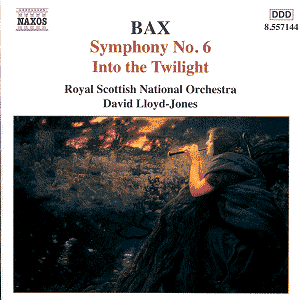This recording of Bax's finest symphony goes straight
to top recommendation. For anyone wanting to hear the work to best effect
this is the disc to have. It stands well above the ClassicO version
(Munich SO/Bostock) which was rather shrill - a pity for a work so dependant
on barbaric Bakstian colour. The Bryden Thomson version is amongst the
best sounding of the Chandos cycle from the ’eighties and ’nineties.
However Lloyd-Jones has a much better grip on urgency and forward movement
so essential to making Bax symphonies work. The only other commercial
recording is from the mid-1960s and that still languishes amid the vinyl
in collections, lofts and outhouses across the world. This Lyrita was
the second Bax symphony ever to be recorded onto LP (the first was the
Revolution/Concert Artist version in which the thin-reedy Guildford
PO were conducted by Vernon Handley in the Fourth Symphony).
The drive, repose, fantasy and even, to some extent,
the microphone placement during the Glasgow sessions for this disc seem
to have been designed to produce an effect close to the Del Mar/New
Philharmonia Orchestra recording. Whether this is by coincidence or
by design hardly matters at all because, rather like the Solti Elgar
2 (where the conductor was rumoured to have spent time studying the
composer's own recordings), the effect is stupendous. By the way the
Del Mar Lyrita sessions must have been amongst the earliest after the
orchestra was compelled to change its name by adding the 'New' for legal
reasons. The grip of that Lyrita recording made many Bax converts (it
won me over instantly) and would do again if ever reissued. Of course
it had its glorious and inglorious weaknesses. Inglorious is the irksome
requirement to change side. Glorious was the indulgent microphone placement
that spot-lit instruments - perhaps an earylish example of Phase 4 techniques.
The Lloyd-Jones version seems to use the Del Mar Lyrita as a pilgrim's
compass. The reading is spot-on. It does not drift and dream although
it does have its designed passages of eloquent introspection and quiet
threat. There are wars inherent in this music as well as the cradling
of the subtle and the ever-young - try 6.53 onwards in the second movement.
Listening to this symphony in such a splendidly direct
reading one can see the reason why Bax's first instinct to dedicate
the work to Karol Szymanowski (recently dead at the date of the premiere)
was so apposite. In fact Bax changed the dedicatee so that Adrian Boult's
name appears in the printed score.
This work is a most beautiful piece slashed and ravaged
into an emotionally cogent and superbly gripping piece of music-making.
Has British music ever produced a moment more shockingly visceral than
the elemental heaven-clawing triumph instantly fallen to supernal dust
in the finale (09.17 track 3)?
Crisp playing from the RSNO extends from the ruthless
attack of the double basses to the edgy immediacy and rugged growl of
the trombones to the upward shuddering rushes of the strings (11.40
and 11.47) to the tricky mithril trumpets that sing out their delicate
hearts at 12.20 in the finale.
Of the fillers, Into the Twilight is an early
Irish work with a rapturous melody of Celtic curve - its horizon stated
with dripping romance on the strings at 4.17. Summer Music is
a warm delight dedicated to Delius whose music it resembles; someone's
Walk to the Paradise Garden surely echoes through at 7.10 onwards.
Bax had written like this before in Spring Fire, Happy Forest
and the Third Symphony.
The Bax picture will be completed by Naxos in the Autumn
with the release of the Lloyd-Jones' Seventh Symphony and Tintagel.
The new Chandos cycle, which it is rumoured will couple some of the
symphonies two to a disc, should start to emerge before summer 2003.
Chandos will also fill the catalogue lacunae among the choral/orchestral
works with pieces such as St Patrick's Breastplate and the yet
more impressive To the Name Above Every Name. The Royal Academy
of Music will be having a Bax week in October. Liverpool’s Philharmonic
Hall will hear the enchanting Chantal Juillet giving two performances
of the Violin Concerto on 8 and 10 May 2003.
And if you are not sure about getting this disc ...
? Well, if you already appreciate Vaughan Williams' Sixth, Szymanowski's
Third, Sibelius's Fifth, Martinů's
Fourth or Fifth, Nielsen's Fifth or Bax's November Woods or
Fifth Symphony then go ahead and buy with confidence. Make no mistake
this is an outstanding Bax recording containing some of the best-judged,
violent and sensuous of interpretations.
Rob Barnett

